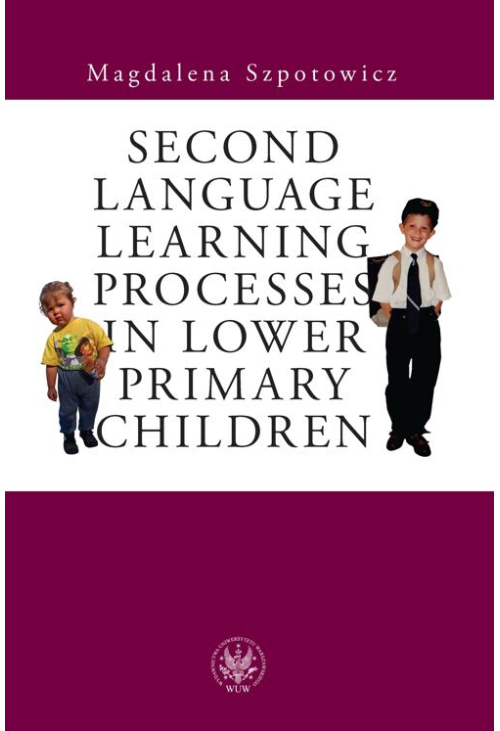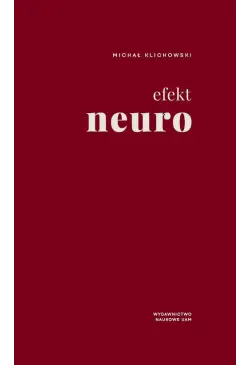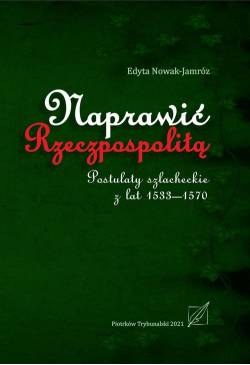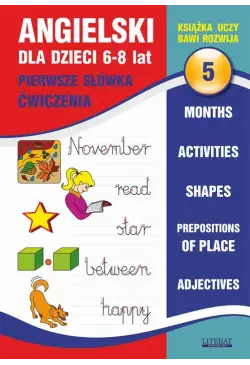
- -14%
ebook Second Language Learning Processes in Lower Primary Children Vocabulary Acquisition
Second Language Learning Processes in Lower Primary Children autorstwa Magdaleny Szpotowicz, wydane przez Wydawnictwa Uniwersytetu Warszawskiego w 2007 roku, to fascynująca publikacja skierowana do specjalistów zajmujących się nauczaniem języków obcych i przyswajaniem słownictwa przez dzieci.
Autorka podjęła się analizy procesów uczenia się drugiego języka (obcego) w kontekście dzieci z niższych klas szkoły podstawowej, skupiając się na przyswajaniu słownictwa oraz umiejętności odtwarzania słów z pamięci. Ta ważna praca naukowa w języku angielskim, publikacja cyfrowa dostępna w formacie PDF, oferuje cenne informacje dla nauczycieli języka angielskiego oraz innych osób zainteresowanych edukacją językową dzieci młodszych.
Dzięki rosnącemu zainteresowaniu ebookami i publikacjami cyfrowymi, takimi jak Second Language Learning Processes in Lower Primary Children, sklepy z ebookami stają się nieocenionym źródłem wiedzy dla studentów, lingwistów, psychologów i przyszłych nauczycieli języka. Kupując tego e-booka, masz szansę zapoznać się z najlepszymi badaniami w dziedzinie przyswajania słownictwa w młodym wieku oraz odkryć nowe perspektywy w nauczaniu języków obcych.
Pobierz tego ebooka i ciesz się bogactwem informacji na temat procesów uczenia się drugiego języka przez dzieci. Zanurz się w świecie Second Language Learning Processes in Lower Primary Children - publikacji, która może zmienić Twoje podejście do edukacji językowej najmłodszych.
Dostępny format ebooka to PDF, co sprawia, że jest on łatwy w obsłudze i czytaniu na różnych urządzeniach. Odkryj świat ebooków, zacznij od Second Language Learning Processes in Lower Primary Children i pozwól sobie na niekończącą się przygodę z literaturą naukową w formie elektronicznej.
Spis treści ebooka Second Language Learning Processes in Lower Primary Children
List of Tables 9List of Figures 11
Acknowledgements 13
Introduction 14
PART ONE: COGNITIVE, EMOTIONAL, SOCIAL AND LINGUISTIC DEVELOPMENT 17
Chapter 1: Human learning 19
1 Approaches to learning 19
2 The role of intelligence in learning processes 21
2.1 Defining intelligence 21
2.2 Intelligence testing 22
2.3 Wechsler Intelligence Scale for Children 23
3 The role of memory in learning processes 26
3.1 Sensory, short-term and long-term memory 27
3.2 Memory strategies 28
3.3 Study strategies 29
3.4 Metamemory 30
3.5 Recall and recognition 30
3.6 Pictorial and verbal encoding: single versus dual memory models 31
4 Cognitive styles and learning styles 32
5 The role of perception in learning processes 38
Chapter 2: Child development and learning processes in children 41
1 Historical foundations 42
2 Theories of child development 46
2.1 Piaget’s cognitive-developmental psychology 46
2.2 Vygotsky’s sociocultural theory 48
2.3 Information processing 49
2.4 Bruner’s theory 50
2.5 Feuerstein’s theory 51
2.6 Ecological systems theory 52
3 Child development and the educational system 53
3.1 Early school years 53
3.2 Gesell’s age group characteristics 54
3.3 Cognitive development – the period of concrete operations 56
3.4 Play as development 56
Chapter 3: First language acquisition 59
1 The history of child language studies 59
2 First language learning theories 62
3 Acquisition of phonology 65
4 The mental lexicon 66
5 Acquisition of the lexicon 68
6 Acquisition of syntax 72
Chapter 4: Second and foreign language acquisition 74
1 Theories of second language acquisition 74
1.1 Krashen’s Monitor Model 76
1.2 Interlanguage theory 79
1.3 Linguistic universals 80
1.4 Cognitive theory 82
2 Factors influencing second language acquisition 83
2.1 Motivation 83
2.2 Aptitude and intelligence 85
2.3 The age factor 87
3 The comparison of first and second language learning 92
Chapter 5: Vocabulary in second and foreign language acquisition 96
1 Vocabulary processing – the bilingual lexicon 98
2 Aspects of knowing a word 98
3 Word difficulty 101
4 The role of memory in vocabulary acquisition 102
5 Vocabulary learning strategies 103
6 Teaching second language vocabulary 106
6.1 Enhancing comprehension 107
6.2 Enhancing production 108
7 Assessing vocabulary knowledge 110
8 Children’s vocabulary learning and teaching 112
PART TWO: RESEARCH ON VOCABULARY RECOGNITION AND RECALL IN CHILDREN AGED 7–8 117
Chapter 6: Methodology of research on language learning and teaching 119
1 An overview 119
1.1 Defining research 119
1.2 Research traditions 120
2 Research methods 125
2.1 Case studies 126
2.2 Triangulation 127
2.3 Quasi-experimental methods 128
3 Ethical problems in educational research 129
4 Methods used in research projects in the primary context 131
Chapter 7: Research design 133
1 Research aims 133
2 Research variables and research questions 133
3 Research design and organization 134
4 Sample 135
5 Research instruments 136
Chapter 8: A qualitative research project on vocabulary recognition and recall in children aged 7–8 138
1 Research subjects 138
1.1 Syllabus 139
1.2 Additional teaching materials 140
1.3 Learning progress 141
2 Methods, Procedures and Materials 143
2.1 Method 143
2.2 Procedure 144
2.3 Materials 146
3 Research instruments 146
4 Case studies 148
4.1 Case study A 150
4.2 Case study B 155
4.3 Case study C 159
4.4 Case study D 164
4.5 Case study E 168
4.6 Case study F 171
4.7 Case study G 175
4.8 Case study H 179
5 Factors influencing subjects’ lexical attainment 182
5.1 Linguistic factors 184
5.2 Psychological factors 198
5.3 Conclusions from the qualitative research project for the quantitative research
Project 200
Chapter 9: A quantitative research project on vocabulary recognition and recall in children aged 7–8 202
1 Introduction 202
2 Research sample 202
3 Research method 203
4 Research instruments 204
5 Quantitative results in the researcher’s perspective 204
5.1 Research question number 1 204
5.2 Research question number 2 206
5.3 Research question number 3 208
6 Correlation analysis of lexical test results and factors observed by the teacher 210
7 Teacher variable 212
8 Discussion 214
Conclusions and implications for teaching English to young learners 216
Bibliography 220
Subject index 234
Selected author’s index 238
Szczegóły ebooka Second Language Learning Processes in Lower Primary Children
- Wydawca:
- Wydawnictwa Uniwersytetu Warszawskiego
- Rok wydania:
- 2007
- Typ publikacji:
- Ebook
- Język:
- angielski
- Format:
- Liczba stron:
- 240
- Miejsce wydania:
- Warszawa
- ISBN dla wersji papierowej:
- 9788323503170
Recenzje ebooka Second Language Learning Processes in Lower Primary Children
-
Reviews (0)

Na jakich urządzeniach mogę czytać ebooki?
- -14%















@CUSTOMER_NAME@
@COMMENT_TITLE@
@COMMENT_COMMENT@